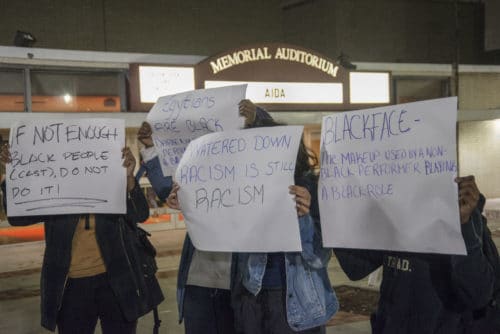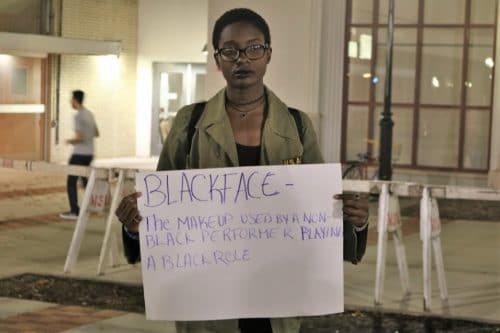
Protestors stood outside Memorial Auditorium to criticize the alleged use of blackface in “Aida”
Photo by Daniella Heminghaus
Students gathered outside of Memorial Hall tonight for the second evening in a row to protest what they said was the use of blackface in Montclair State University Department of Theatre and Dance’s production of “Aida.”
But the theatre department decried the protest, insisting they were only employing standard use of stage makeup.
“This is not about stage makeup,” said student Dania Felix, who spearheaded the protests. “This is about darkening yourself for a person of color role.”
Felix explained, “I was on the show, and I had to remove myself because I just felt really uncomfortable with it and with what was going on in it. I talked to the head of the department, and they just kind of dismissed me and said that I didn’t know what I was talking about in terms of stage makeup.
“Aida” is a musical set in Egypt, where an Ethiopian princess—after whom the play is named—is brought after being captured. A plotline of love and tragedy unfolds in the original opera by Guiseppe Verdi. The Montclair State production, directed by assistant Professor Gary John La Rosa, opened last night and star Virginia Vass, an African-American student, as Aida.
However, the use of make-up to darken the bare-chested students playing Egyptian soldiers sparked some controversy. While some have labeled it blackface—the practice of painting an actor’s face to portray a character of a different race—others have deemed it a routine part of acting in theatre.
“The students playing soldiers who are bare-chested and who are out in the sun—as far as their characters go—are toning their skin to give them a little bit of a shade, but it’s not to make them look African-American or black or any other nationality other than who they are,” said Michael Allen, associate professor of theater and dance. “I mean, we don’t put wigs on them. We’re not putting afro wigs on them and making them look like they’re African. They’re playing who they are as characters.”
According to Felix, she is the reason the wigs were nixed. She explained that, in the earlier stages of the show, actors were using dyed mops as wigs in order to portray their characters—a situation she said was “really offensive.”
“I’m trying to have a good discussion and no one wanted to have a discussion with me prior to the protest,” Felix said. “This was my last option. I wasn’t trying to get here. I was trying to get this resolved beforehand and it wasn’t being resolved. I understand that this is something that people won’t get, perhaps, but I’m here to educate. I’m here to have the conversation.”
Students acting in “Aida” declined to comment, stating that their professors and advisers recommended they remain quiet.
“Our student production of Aida is the work of a widely multi-cultural cast and crew,” said Randy Mugleston, chairperson of the theatre and dance department. “The use of stage makeup and costumes are a routine aspect of all theatrical work. In this instance, the use of base makeup is to create the sense of individuals who are out in the sun for most of their lives. It is in no way meant to represent a specific skin color or race of people. As a theatrical convention, makeup is also used to create a color pallet with the performers to assist lighting. This by no means falls into the realm of blackface.”
The number of protestors dwindled between the first and second nights of the show. Around 7:30 p.m. on day two, five students stood alongside Felix, covering their faces when photographs were taken with signs that read, “Watered down racism is still racism.”
“I listened to their point of view, and I disagree because it doesn’t appear like they’re using blackface in the show,” said Alexandra Dadon, a music education major who is part of the orchestra for “Aida.” She explained that she engaged with protestors last night and doubted that many of them had even seen the show.
“Apparently they’re using bronzer just to make themselves very slightly darker, but stage makeup is supposed to be darker than your original skin tone anyway,” she continued. “When the actors are on stage, it doesn’t look like they’re obviously darker. The actors who are white still look very white, so there’s no true blackface going on. They’re not mocking. It’s not in a distasteful way.”
“I’m glad to see at least somebody has passion on this campus, and is making a statement as far as what they feel,” said Allen, though he disagreed with the protestors’ cause. “I think a lot of people are sort of misunderstanding what the reason for this is… I encourage anybody to see the show, and make a judgement for yourself. You’ll be looking there, looking for a blackface, and you’ll never find it.” He laughed as he concluded, “It’s not there.”
There will be four more performances of “Aida” by Montclair State’s Department of Theatre and Dance—Oct. 21 at 7:30 p.m., Oct. 22 at 2 p.m. and 8 p.m. and Oct. 23 at 2 p.m.
BLACK FACE IS NOT OKAY‼️‼️‼️ #MontclairState #BlacklivesMatter #AIDA #blackface #share #retweet pic.twitter.com/K55pTSuyxz
— King Zay! (@zayyyyyyyy_) October 20, 2016



